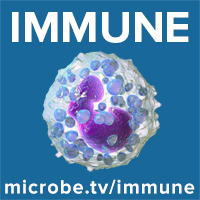Immune talks with David Peterson and Kim Klonowski from the University of Georgia about their careers, their People, parasites, and plagues podcast, placental malaria immunity, and and how interferons in the thymus affect T cell…
From the 2024 Society for Leukocyte Biology meeting, Immune talks with Amy Hise about her career in science, her current research using mouse models for investigating fungal immunity and navigating the challenges of being a…
From the 2024 Society for Leukocyte Biology meeting at Michigan State University, home of the Spartans, Immune’s Cindy and Brianne talk with Liz Kovacs and Jim Lederer about their careers, dirty mice, old mice, and…
From the The Society for Leukocyte Biology 2024 conference at Michigan State University, Cindy and Brianne sit down with Amanda Brown from Johns Hopkins School of Medicine to talk about her career and the research…
Immune describes the use of bespoke antibodies to characterize immune cell populations in cave nectar bats, and co-option of retrotransposons to activate hematopoietic stem cells and erythropoiesis. Hosts: Vincent Racaniello, Cindy Leifer, Steph Langel, and Brianne…
Immune 87: When the immune system misbehaves
- January 14, 2025
- Tagged as: Allergies, allergy, antigen presentation, asthma, autoantibodies, autoimmune disease, autoimmunity, B cells, basophils, EBV, IL-33, immune, immunity, immunology, inflammation, invariant chain, Lupus, MHC class II, SLE, Systemic Lupus Erythematosus, T cells, type two inflammation, virus
Immune discusses basophils as regulators of of lung inflammation over space and time, and neoself-antigens as the primary target for autoreactive T cells in human lupus. Hosts: Vincent Racaniello, Cindy Leifer, Steph Langel, and Brianne Barker…
Immune explains how distinct olfactory mucosal macrophage populations mediate neuronal maintenance and pathogen defense, and failure to establish durable SARS-CoV-2-specific plasma cells in the bone marrow long-lived compartment after mRNA vaccination. Hosts: Vincent Racaniello, Cindy Leifer,…
Petter Brodin joins Immune to discuss immune system adaptation in individuals assigned female sex at birth and undergoing gender affirming testosterone therapy (trans-men). Hosts: Vincent Racaniello, Cindy Leifer, Steph Langel, and Brianne Barker Guest: Petter Brodin…
Immune discusses two stories of immune cells eating other cells: microglia engulfing brain neurons to shape cortical development and behavior, and mast cells trapping neutrophils to increase their functional and metabolic fitness.
Immune reviews the local and systemic responses after human SARS-CoV-2 challenge infection, and how bat antibodies display elevated antigen binding strength and diversity at higher temperatures that are characteristic of flight.




